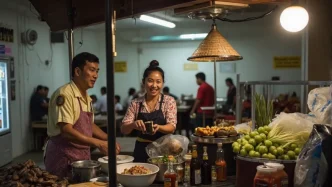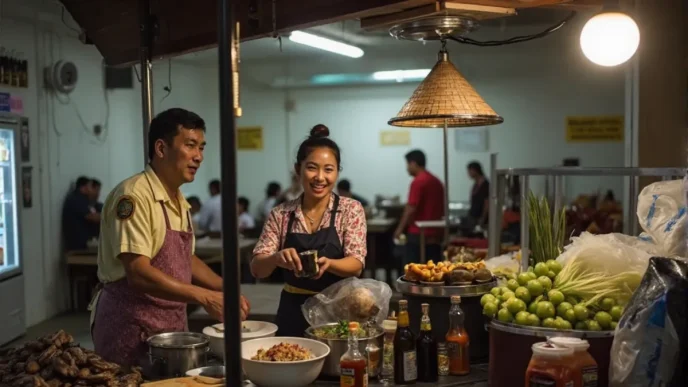In a region long defined by its diverse political landscapes, South East Asia is witnessing a series of significant shifts that could reshape its future. From Thailand to Vietnam, governments are grappling with domestic pressures and international scrutiny, as recent developments highlight both progress and persistent challenges. The stakes are high, with economic stability, human rights, and regional cooperation hanging in the balance.
Thailand’s Push for Reform Amidst Uncertainty
Thailand, a nation with a history of political turbulence, is once again at a crossroads. Recent reports from local outlets indicate that the government is considering sweeping reforms to address long-standing issues of governance and public trust. While specific details remain scarce, the proposed changes are said to focus on decentralizing power and increasing transparency in decision-making processes. This comes at a time when public sentiment, as reflected in local media, appears divided—some see it as a step toward genuine democracy, while others remain skeptical of the government’s intentions.
The economic implications of these potential reforms are significant. Thailand’s economy, heavily reliant on tourism and exports, has faced challenges in recent years due to global uncertainties and domestic instability. Any political overhaul will need to balance economic recovery with addressing public demands for accountability. Analysts suggest that without careful implementation, these reforms could exacerbate existing tensions rather than resolve them.
Vietnam’s Balancing Act: Growth and Control
Across the border in Vietnam, the government under the Communist Party of Vietnam (CPV) continues to navigate a delicate balance between economic growth and political control. The Vietnam Fatherland Front, a political coalition under CPV leadership, has recently emphasized initiatives aimed at modernizing infrastructure while maintaining strict oversight of dissent. This dual approach reflects Vietnam’s broader strategy of fostering development without ceding ideological ground.
Recent data from trusted regional sources points to impressive economic strides, with Vietnam emerging as a key player in global manufacturing. However, this progress is tempered by concerns over freedom of expression and cybersecurity regulations under the Law on Cybersecurity 2018. Local reports suggest that while foreign investment continues to pour in, the stringent legal framework has raised questions about long-term sustainability and international partnerships. How Vietnam addresses these concerns will likely influence its standing on the global stage.
Regional Dynamics and International Eyes
The political developments in Thailand and Vietnam do not exist in isolation. South East Asia as a whole is under increasing scrutiny from international bodies and neighboring powers. Issues such as human rights, environmental policies, and trade agreements are becoming flashpoints in regional discussions. For instance, the Association of Southeast Asian Nations (ASEAN) has been urged to take a more active role in mediating domestic conflicts and fostering dialogue, though its principle of non-interference often limits such efforts.
In Thailand, the potential reforms are being closely watched by international observers who see them as a litmus test for the country’s commitment to democratic principles. Similarly, Vietnam’s handling of cybersecurity laws and economic policies is drawing attention from global tech giants and human rights organizations alike. The outcomes of these domestic policies could have ripple effects across ASEAN, influencing everything from trade negotiations to regional security frameworks.
Public Sentiment and the Path Forward
Public opinion in both nations, as gleaned from local media, underscores a complex mix of hope and frustration. In Thailand, citizens are eager for change but wary of promises that have historically fallen short. In Vietnam, rapid economic progress has bolstered government support among some, yet others remain critical of restrictions on personal freedoms. These contrasting sentiments highlight the broader challenge facing South East Asian governments: how to modernize and grow while addressing deeply rooted social and political grievances.
The role of civil society in shaping these narratives cannot be understated. Grassroots movements, though often operating under significant constraints, continue to push for greater accountability and representation. Their influence, while not always immediately visible in policy outcomes, is a critical undercurrent that could shape the trajectory of reforms in the years ahead.
Economic Underpinnings of Political Change
Beyond the political rhetoric, economic factors are a driving force behind many of these shifts. Thailand’s tourism sector, for instance, remains a cornerstone of its economy, contributing significantly to GDP. Any political instability risks deterring visitors and investors, a reality that policymakers are keenly aware of. Similarly, Vietnam’s manufacturing boom, fueled by foreign direct investment, necessitates a stable political environment to sustain growth. The interplay between economic imperatives and political decisions will likely define the success or failure of current initiatives.
Moreover, regional economic integration through frameworks like the Regional Comprehensive Economic Partnership (RCEP) adds another layer of complexity. Both Thailand and Vietnam stand to gain from deeper trade ties, but political missteps could jeopardize their positions within such agreements. The challenge lies in aligning domestic reforms with regional commitments, a task that requires both vision and pragmatism.
Looking Ahead: Unanswered Questions
As South East Asia stands at this critical juncture, several questions remain unanswered. Will Thailand’s proposed reforms translate into meaningful change, or will they become another chapter in a cycle of unmet expectations? Can Vietnam sustain its economic momentum while addressing international concerns over governance? And how will ASEAN navigate the competing interests of its member states to foster a cohesive regional identity?
These questions underscore the uncertainty that defines the region’s political landscape. What is clear, however, is that the decisions made in the coming months will have lasting implications—not just for Thailand and Vietnam, but for South East Asia as a whole. As reforms progress and policies evolve, their impact on stability, growth, and regional cooperation remains an open question, one that will shape the future of this dynamic and diverse region.
















